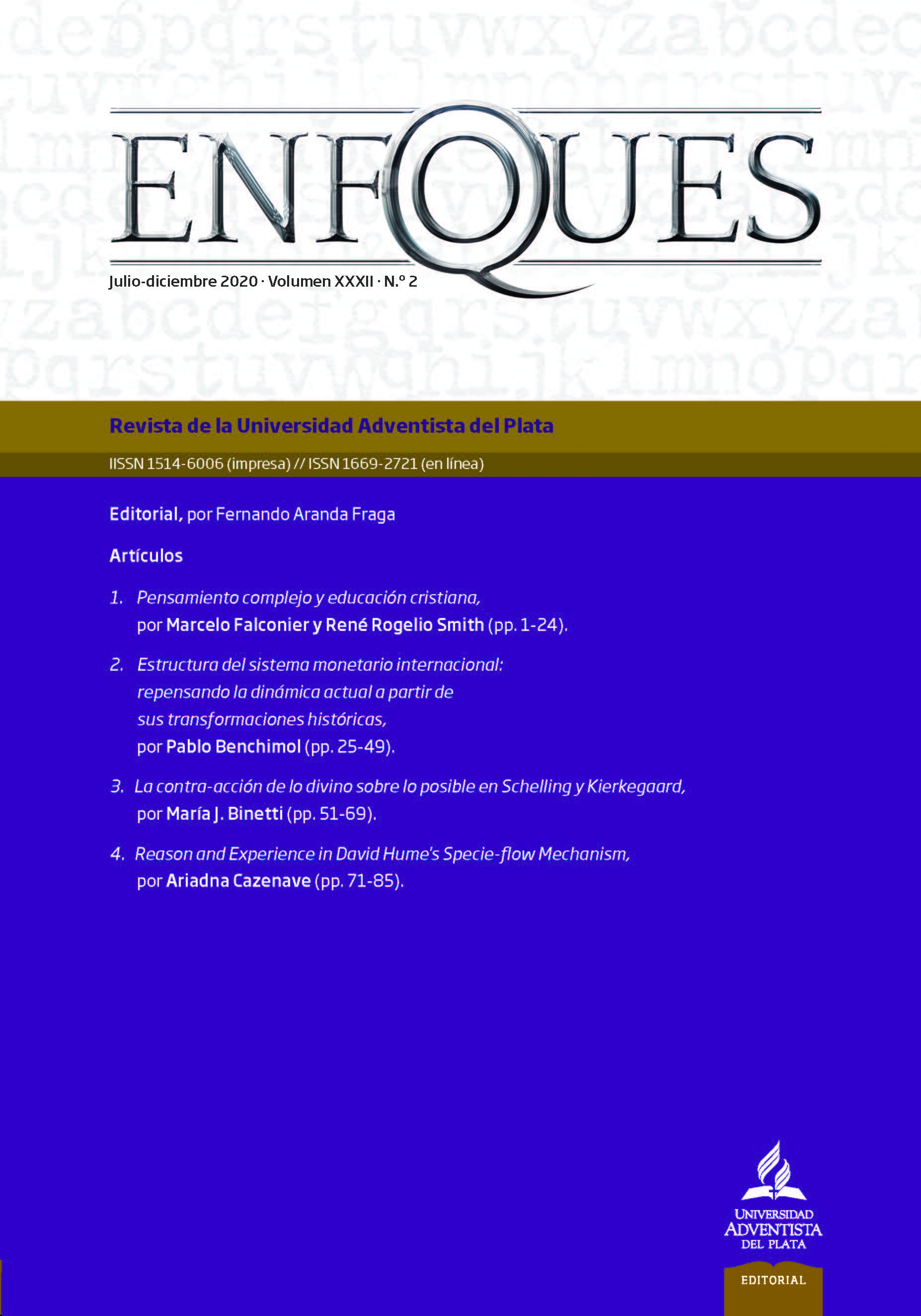A contra-ação do divino ou sobre o possível em Schelling e Kierkegaard
Palavras-chave:
Reflexão, Negatividade, Poder, Nascimento, Existência, LiberdadeResumo
Este artigo tentará mostrar os termos em que o conceito de possibilidade elaborado por Friedrich W. J. Schelling rompe com o dualismo metafísico entre o Ato imutável e a matéria prima, introduzindo no absoluto alguma reflexão, contração ou subtração da qual emerge a infinita possibilidade do nascimento divino. Kierkegaard, por outro lado, encontrará nesta possibilidade a origem da existência singular e o mecanismo de seu devir incansável e contraditório. Reflexão, negatividade, possibilidade e liberdade são as três principais categorias de um novo conceito de existência, que rompe com o dualismo clássico para dar à luz o divino.
Downloads
Referências
Jacob Böhme, Aurora (Frankfurt am Main und Leipzig: Gerhard Wehr. Insel., 1992), 464.
Cf. Friedrich W. J. Schelling, Filosofía de la Revelación, Cuadernos de anuario filosófico, Serie Universitaria 51 (1998), 138.
Friedrich W. J. Schelling, Investigaciones filosóficas sobre la esencia de la libertad humana y los objetos con ella relacionados (Barcelona: Anthropos, 1989), 167, 253.
Cf. Friedrich W. J. Schelling, The Grounding of Positive Philosophy. The Berlin Lectures (New York: State University of New York), 175-77.
Schelling, Investigaciones filosóficas, 169.
Friedrich W. J. Schelling, Clara. Un diálogo sobre la muerte (Santiago de Chile: Editorial Universitaria, 2015), 97.
Ibíd., 89.
Schelling, Investigaciones filosóficas.
Friedrich W. J. Schelling, Las edades del mundo (Madrid: Akal, 2002), 247.
Schelling, Investigaciones filosóficas, 165.
Ibíd., 165-7.
Ibíd., 139.
Schelling, The Grounding of Positive Philosophy, 209.
Schelling, Investigaciones filosóficas, 169.
Ibíd., 281.
Ibíd., 169.
Cf. Ana Carrasco-Conde, “Fundamental Perspectives: Simulacra, History and the Influence of Schelling in contemporary Thought”, International Journal of Zizek Studies 10, n.o 3 (2019): 1-20; Markus Gabriel, “Aarhus Lectures. Schelling and Contemporary Philosophy. Second Lecture: Schelling’s Ontology in the Freedom Essay”, SATS-Northern European Journal of Philosophy 15, n.o (2014): 75-98; Markus Gabriel, Transcendental Ontology: Essays on German Idealism (New York: Continuum, 2011).
Schelling, Investigaciones filosóficas, 163.
Schelling, Las edades del mundo, 183.
Ibíd.
Schelling, Investigaciones filosóficas, 110.
Schelling, Las edades del mundo, 187.
Ibíd., 185.
Slavoj Žižek, Absolute Recoil. Towards a New Foundation of Dialectical Materialism (London & New York: Verso, 2014), 342.
Schelling, Las edades del mundo, 212.
Ibíd., 244.
Ibíd., 208.
Schelling, Investigaciones filosóficas, 147; también, Schelling, Escritos sobre filosofía de la naturaleza (Buenos Aires: Alianza, 1996), 247-48.
Søren Kierkegaard, Søren Kierkegaards Samlede Værker (Copenhagen: Gyldendal, 1920-1936), VII 321; Kierkegaard, Søren Kierkegaard Skrifter (Copenhagen: Gads Forlag, 1997-2013), 7, 304.
Søren Kierkegaard, Søren Kierkegaards Papirer (Copenhagen: Gyldendal, 1909-1948), I A 29-30; IV A 102; IV A 157; Kierkegaard, Skrifter, JJ:374.d; JJ:160.
Kierkegaard, Samlede Værker, XIV 287-306.
Kierkegaard, Papirer, XI2 A 97 / Kierkegaard, Skrifter, NB33:19.
Cf. ibíd., X4 A 212 / NB23:205.
Ibíd., VII1 A 181 / NB:69.
Kierkegaard, Samlede Værker, IV 267 / Skrifter, 4, 275.
Cf. Kierkegaard, Notes of Schelling’s Berlin Lectures (Princeton: Princeton University Press, 1989), 338-339.
Kierkegaard, Samlede Værker, IV 349 / Skrifter, 4, 351.
Kierkegaard, Papirer, IV 347 / Skrifter, 4, 349.
Ibíd., V A 16 / JJ:209.
Kierkegaard, Samlede Værker, IV 466 / Skrifter, 4, 438.
Ibíd.
Kierkegaard, Papirer, X1 A 328 / Skrifter, NB11:33.
Cf. Ibíd., XI1 A 400 / NB31:68.
Kierkegaard, Samlede Værker, IV 398 / Skrifter, 4, 394.
Cf. Ibíd., I 319 / 2, 295.
Ibíd., XIV 384 ss.; Papirer, VIII2 B 83 ss.
Ibíd., III 243 / Skrifter, 4, 53.
Downloads
Publicado
Edição
Seção
Licença
Copyright (c) 2020 María José Binetti

Este trabalho está licenciado sob uma licença Creative Commons Attribution-NonCommercial-ShareAlike 4.0 International License.





